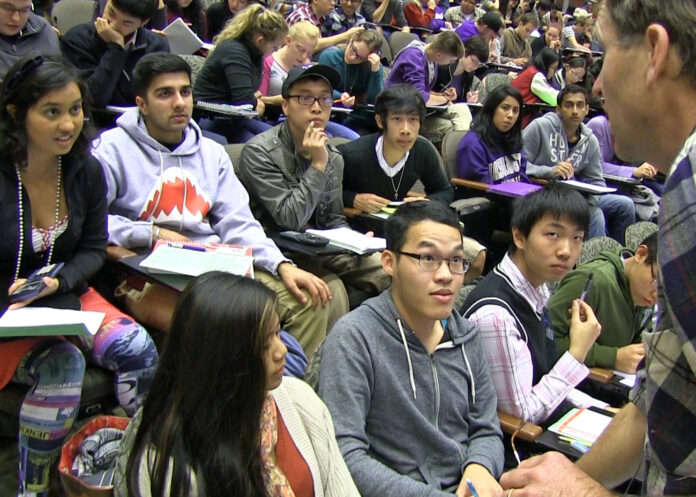
The rise of digital communication in today’s world nurtures the concept of cultural exchange and bursts the boundaries between educational institutions all around the globe. Students are nowadays offered myriad opportunities to spend a gap year, complete their studies, or carry out their graduation projects abroad.
Many students studying abroad, for instance, rose to 341,751 during the academic year 2017-2018, according to NAFSA, and this number seems to be on the rise. But it is found that students feel embarrassed and face language barriers to communicate with other country’s people. Is it stopping you from studying in a different country? If yes, then you must consider some techniques to overcome your problem.
In the following write-up, we will discuss the environment of global learning and how students are going to different countries to seek education. If you are facing any language barriers, then how you should tackle your problem. You have to be confident and face people without any hesitation.
Global Learning Environment

The world is slowly turning into an intertwined network of learning opportunities with many universities initiating studying abroad or cultural exchange programs. Most of the US higher educational institutes accept international scholars and fellows, while many of them offer their students the chance to study abroad.
At its global strategy, Yale University stated that global engagement marks one of its core missions, revealing several schemes within its global student network. It entails Yale Jackson School of Global Affairs, international students and scholarship programs, curricular initiatives, among others.
Similarly, Berkeley organizes a regular studying abroad program, allowing students to participate in global studying or internship programs once or more during their academic career without the need to learn a new language.
Exchange Programs

Many extracurricular activities and non-profit organizations follow suit and arrange different exchange programs, even for high-school students. International Cultural Exchange Services (ICES) is one non-profitable organization that offers excellent opportunities for American high-school students to explore other parts of the world.
Students all around the world love to study abroad, not only to live new experiences but also to discover new cultures and exchange information with international students. Just like online e-learning solutions gain further popularity, studying abroad represents a rising trend in many countries, creating the seed of a global learning community with no physical borders.
Is Language a Challenge?

From the submission to campus life abroad, language barriers could hinder your plans to study overseas, learn from other cultures, or interact with international students. To make your abroad experience better, you need to figure a way to break through these language gaps, according to Future Trans.
Finding specialized educational translation and localization services would help you as you fill in the application form, submit the required documents, fly to your destination, communicate with international students, and learn about the other cultures. Do not let language barriers stand in the way of your genuine attitude for exploration, even if you do not have enough time to learn a new language!
How to Overcome Your Problem?
1. Do Not Feel Shy to Talk

Whenever you see different people around us, we feel shy and do not like to interact much. But it is ultimately the wrong thing. You should initiate talking and try to make friends. The other person also knows that you do not belong to his country. Therefore, he will try to understand what you are speaking and cooperate with you.
It is completely fine if they ignore or are not able to understand. You can convey a message to someone else. Less interaction will not make you bold and strong in abroad university. You have to stand for yourself, no matter how you do it.
2. Prepare Your Mind for Stress
In the beginning, it can be very stressful when no one is talking to you. It will be difficult for you to speak the native language and understand what others are saying. You may feel exhausted, and sometimes, you may feel that you need a break.
Never miss that chance. Take a cup of coffee and give some time to convince your mind that it is ok to be different in your university. When you prepare your mind, then you will easily survive and know how to live in a different country within a group of unknown people.
3. Practice Enough to Be Fluent in Particular Language

You need to approach local people to interact with them in an improper language. You have to speak confidently and practice a lot. It will help you to become perfect in the native language when you try to speak and practice more. In some days, you will observe that you are getting fluent and speak perfectly.
There are many applications that can help in translating languages and provide required data during communication. You can also use those apps to learn different words and formation of sentences to speak perfectly. If you are having any problem understanding anything, then you can ask your friends to tell the meaning of a word or a phrase.
4. Laugh at Your Mistakes
You can eliminate the feeling of embarrassment of your mistakes by laughing at it. This is the perfect way to ignore little things and behave normally in front of all. Other people will also join you while laughing and in this way, they will not make fun of you instead cooperate with you. They can also suggest better words and correct sentences to you so that you avoid making mistakes again.
5. Try to Copy the Accent

It is quite challenging to speak the language of any other country, but you can copy the accent in the beginning. In this way, you will understand how a person is pronouncing certain words. You can easily learn any language by its accent. You must target it and try to copy in the same way.
The Bottom Line
Overcoming language barriers can be very challenging, but you need to be confident and practice more to solve the problem. When you are going to study abroad, it is necessary to learn the native language because you may find difficulty in communicating with people. You will not be able to understand anything, and hence, no one will talk to you. It is possible to prevent the situation by following suggestions for overcoming the problem.














